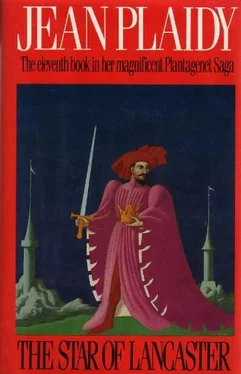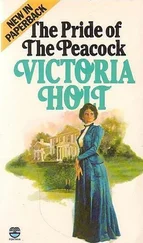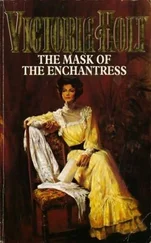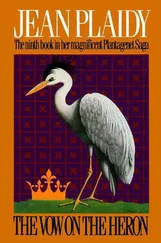Jean Plaidy
The star of Lancaster
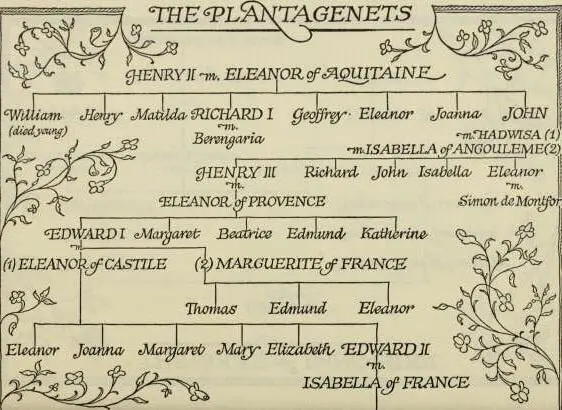
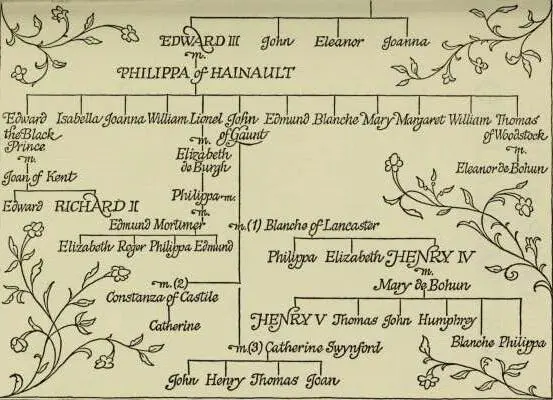
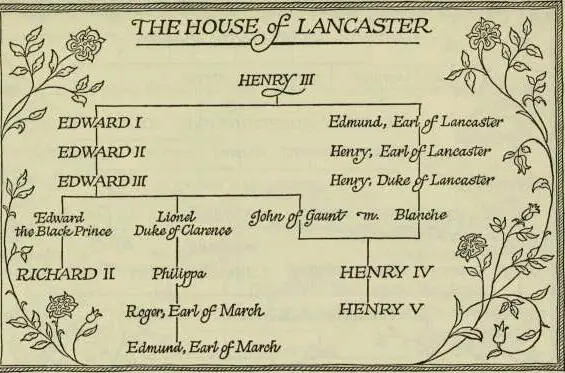
The walls of the convent rose serene and beautiful among the green meadows. Close by were the grey walls of Pleshy Castle, the home of the little girl who was seated at the table her lesson book spread out before her. How quiet it was in the convent ! she was thinking. There was a peacefulness here which she found very comforting, the more so because she had become aware of a certain turmoil in the castle.
Mary had always been a little in awe of Eleanor, her elder sister, and perhaps more so of Thomas, Eleanor's husband. He was a very important man, of course; and Eleanor was proud to be his wife. She was constantly reminding her little sister that her children would be royal because Thomas was the King's son.
It was true. Thomas of Woodstock, as people called him because of the place where he was born, was in fact the Earl of Buckingham and the youngest son of King Edward the Third and Queen Philippa. Mary could remember when he and Eleanor were married. Her father had been alive then and there had been great rejoicing at the castle, for it was a brilliant match for the de Bohuns, even though Humphrey de Bohun was a very rich man owning as well as Pleshy Castle those of Monmouth and Leicester and a mansion in the City of London; and, although it was because of his immense wealth that the marriage had been approved by the royal family, the de Bohuns had been well aware of the honour done to them.
Then everything had changed because her father—Humphrey de Bohun to give him his full title—had died and his vast fortune was to be divided between his two daughters for there was no male heir. Thus Eleanor, wife of royal Thomas, and ten-year-old Mary became the richest heiresses in England.
Eleanor was delighted about that; so was Thomas; Mary was amazed at their excitement. What difference did it make to them? she wondered. They had been very rich before. What more could they want?
When she asked this, she was sharply told by Eleanor not to be foolish and she was subdued for she had always been very conscious of Eleanor's seniority. Eleanor had always made her aware of it, even before their father's death. She was much older, Eleanor had pointed out, and Mary was only a child. She must do as she was told by those of superior knowledge and that naturally meant an elder sister.
Brooding now over those days as she sat within the peaceful walls of the convent her books lying neglected before her, she was thinking of all that had happened since her father's death and the attitude of Eleanor and her husband towards her. It was almost as though they were planning something.
The thought made her feel slightly uneasy and she was more than ever aware how pleasant it was to be in the convent among the gentle nuns. Presently one of them would come and look at her work. If it was good, little would be said, for it was implied that they expected it to be good; if it was carelessly done or betrayed an ignorance of the subjects set there would be a gentle reproof which strangely enough hurt her more than anger and contempt would have done.
Mary liked the nuns; she liked the convent; the atmosphere fascinated her. The Abbess had told her that the Poor Clares lived only to serve. They moved about the convent like grey silent ghosts for if they wished to speak to each other they must first receive permission to do so from the Abbess. They slept on hard boards; they fasted; they followed strict laws of poverty; and it was their duty to forget their own needs and devote their time to the care of the sick and the poor.
Often she compared their lives with those who lived in her castle home. Eleanor liked luxury and so indeed did Thomas. He had been accustomed to it all his life, for his father had kept an extravagant court and King Richard's it was said was even more luxurious. Yet here within the convent walls, the Poor Clares slept on their hard boards, denied themselves food, taking only that which was necessary to sustain them that they might continue with their work, and Mary often thought how strange it was that there could be such differences in people's lives.
Eleanor loved rich clothes and her seamstresses were working constantly on new garments for her. She would spend hours discussing which two colours harmonized—for all her gowns were two-coloured now in accordance with the fashion —and fine silks would be placed together and matched. Her cote hardies were very splendid indeed and often decorated with gems. Her hanging sleeves grew longer with every fresh gown and she was happy to hide her hair—which was straight and not very abundant—under a very elaborate head-dress.
Mary often thought what the nuns could have done with the money which her sister spent so freely on adorning herself. She often compared her with the nuns in their grey gowns, shapeless and loose, held in at the waist with their linen cords which were tied with four knots to represent, and to remind them of, their four vows. She compared the serenity of the nuns with the restless activity of her sister and it seemed clear to her which of them found life more satisfactory.
It was not one of the nuns who came to her but the Abbess herself. Mary was overcome with awe and she felt that such a visitation must be of some portent.
The Abbess said: "Well, my child, you have done your lessons for the day." She took the books and glanced at them; then her piercing eyes were on the girl.
A beautiful child, she thought. She had inherited more than her share of the family's good looks. The de Bohuns had been benefactors of the convent for years and it was natural that this little girl should have been given over to them that they might educate her. It happened to many children of high birth and they must welcome it. Noble families were their life blood. They needed the patronage of those who in so many cases thought to expiate their sins by endowing a convent and by supporting it throughout their lives. It was ironical that such holy places were so largely dependent on sinners and doubly so that the greater the sins committed the more munificent were the gifts likely to be.
Now she was responsible for the education of this young girl; but she knew that ambitious Thomas of Woodstock and his equally ambitious wife had sent her here for a purpose.
It would be good for the convent if that purpose was successful; but the Abbess did not wish it to be so unless it was the best thing for the girl. With her dark hair and her gentle rather doe-like eyes, her heart-shaped face and her delicate features she showed signs of real beauty. Her nature was gentle but alert; she would be steadfast but the fact was that the Abbess was unsure.
As yet, she thought, she is too young to decide.
"It is a fine day," she said briskly. "Let us walk awhile in the gardens."
This was strange. The Abbess had never walked in the gardens with her before, but one thing Mary had learned in the convent was not to ask questions so she shut her books immediately and rose.
She followed the Abbess through the stone corridors. They passed silent-footed nuns, who, preserving their silence, did not speak. In the gardens, where vegetables and herbs were grown, three nuns were working: they did not look up. In the bakery it would be the same, as in the wash-house and the ale house. They were all working steadily away and in silence as they would be in the still rooms where the herbs were being made into medicines for the use of the poor.
Читать дальше
